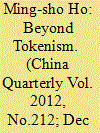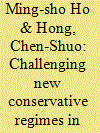| Srl | Item |
| 1 |
ID:
116491


|
|
|
|
|
| Publication |
2012.
|
| Summary/Abstract |
This article challenges the accepted view that during the period of martial law Taiwan's labour unions were "a useless token." Focusing on the petroleum and sugar industries, I analyse the incremental process of how party-state control over the labour unions was converted by the workers themselves in Taiwan's national enterprises. In the early 1950s, the KMT's policy of unionizing enterprises was a complementary strategy to reinforce its slow and unsuccessful party-state penetration. With the unions' prominent role in welfare provision, workers were encouraged to develop a sense of stakeholdership. Over the years, labour unions legitimatized the interests of worker members and thus gave rise to an explosion of claim-making activities - what I call "petty bargaining." By the mid-1980s, labour unions, although still dominated by the KMT, were no longer a Leninist transmission belt, but rather functioned as a de facto complaint centre - an often overlooked precondition for the rise of post-1987 independent labour unionism.
|
|
|
|
|
|
|
|
|
|
|
|
|
|
|
|
| 2 |
ID:
114647


|
|
|
|
|
| Publication |
2012.
|
| Summary/Abstract |
This article compares anti-American beef politics in South Korea (2008) and
Taiwan (2009) to solve the puzzle of why two similar social protests resulted in
dissimilar outcomes. Given the highly comparable political contexts of conservative
ascendancy, we argue that cultural factors determined the movement trajectories.
The presence of anti-Americanism and the centrality of beef in the national diet
produced a strong anti-government movement in Korea but not in Taiwan.
|
|
|
|
|
|
|
|
|
|
|
|
|
|
|
|
| 3 |
ID:
101312


|
|
|
|
|
| Publication |
2010.
|
| Summary/Abstract |
In this article, we analyze the process of institutional change in Taiwan's disability field by focusing on the role of social movements. An institutional perspective emphasizes how a particular logic in an organizational field generates formal and informal institutions that define how persons with disabilities are treated in a society. Before the 1990s, the charity model was dominant, and later it came to be challenged by the disability movement, which advocated for the social model. We argue that the transition to a social model was a major achievement by disability organizations, which successfully combined the dual roles of advocate and service provider. By making strategic use of welfare privatization in the 1990s, they were able to mobilize a series of lobbying campaigns. Their efforts culminated in the passing of the Physically and Mentally Disabled Citizens Protection Act in 1997, which marked the beginning of the social model in Taiwan.
|
|
|
|
|
|
|
|
|
|
|
|
|
|
|
|